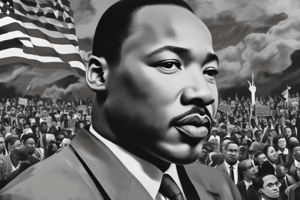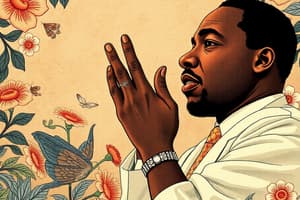Podcast
Questions and Answers
What was the primary method that Martin Luther King Jr. advocated for advancing civil rights?
What was the primary method that Martin Luther King Jr. advocated for advancing civil rights?
- Violent protests
- Non-violence (correct)
- Political lobbying
- Legal battles
Which significant event did Martin Luther King Jr. lead in 1955?
Which significant event did Martin Luther King Jr. lead in 1955?
- The Southern Christian Leadership Conference formation
- The Montgomery bus boycott (correct)
- The march on Washington
- The Freedom Rides
What major speech did Martin Luther King Jr. deliver during the 1963 march on Washington?
What major speech did Martin Luther King Jr. deliver during the 1963 march on Washington?
- I Have a Dream (correct)
- The Ballot or the Bullet
- Give Me Liberty
- The Four Freedoms
In which year did Martin Luther King Jr. receive the Nobel Peace Prize?
In which year did Martin Luther King Jr. receive the Nobel Peace Prize?
What aspect of social justice did King expand his focus on in his final years?
What aspect of social justice did King expand his focus on in his final years?
What significant recognition did King receive posthumously?
What significant recognition did King receive posthumously?
Which violent event occurred following the assassination of Martin Luther King Jr.?
Which violent event occurred following the assassination of Martin Luther King Jr.?
What organization did Martin Luther King Jr. help to found in 1957?
What organization did Martin Luther King Jr. help to found in 1957?
Which form of recognition did numerous towns and states establish in honor of King?
Which form of recognition did numerous towns and states establish in honor of King?
What physical memorial was dedicated in Washington, D.C. in 2011?
What physical memorial was dedicated in Washington, D.C. in 2011?
Flashcards are hidden until you start studying
Study Notes
Martin Luther King Jr. Overview
- Born in 1929 and assassinated in 1968, King was a prominent American Baptist minister and civil rights leader.
- Became the most visible spokesperson for the Civil Rights Movement from 1954 until his death.
- Advocated for civil rights through non-violent methods, emphasizing peaceful protests and resistance.
Civil Rights Movement
- A decades-long struggle to secure legal rights for African Americans, aiming to end racial segregation and discrimination.
- Originated in the late 19th century during the Reconstruction era, gaining momentum in the 1950s and 1960s.
- Involved numerous strategies, groups, and grassroots protests that led to significant legislative reforms.
Key Contributions
- Led the Montgomery Bus Boycott in 1955, a pivotal event in the civil rights movement.
- Became the first president of the Southern Christian Leadership Conference (SCLC) in 1957.
- Organized the 1963 March on Washington, where he delivered the iconic “I Have a Dream” speech, advocating for racial harmony and justice.
Honors and Achievements
- Awarded the Nobel Peace Prize on October 14, 1964, for his commitment to fighting racial inequality through nonviolent means.
- In his later years, broadened focus to include issues of poverty and economic justice.
- Assassinated on April 4, 1968, by James Earl Ray in Memphis, Tennessee, leading to riots across numerous U.S. cities.
Legacy
- Posthumously received prestigious honors including the Presidential Medal of Freedom and the Congressional Gold Medal.
- Martin Luther King Jr. Day established as a holiday in numerous cities and states to commemorate his contributions.
- Hundreds of streets named in his honor across the U.S.; a county in Washington State was also renamed for him.
- The Martin Luther King Jr. Memorial was dedicated on the National Mall in Washington, D.C., in 2011, serving as a tribute to his legacy.
Studying That Suits You
Use AI to generate personalized quizzes and flashcards to suit your learning preferences.




